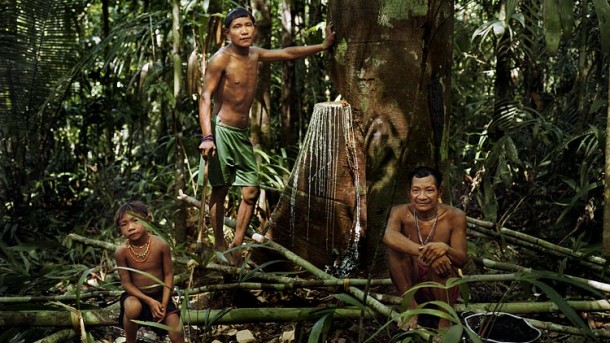Y’all: I heard the craziest story recently. I’ve mentioned the Philosophy Bites podcast here before, which has wonderfully short little snippets of philosophy nerd-dom. This particular episode, “Daniel Everett on the Nature of Language,” was talking about the Piraha (pronounced pee-dah-hawn) people in the Amazon. Everett has spent years and years living among them and studying their language, which seems to break ALL THE RULES of what we have wrongly assumed to be universal about language. For example:
– They do not have numbers or counting. What? How? Well, apparently they just say “I caught a fish” or “I caught some fish” and they just don’t feel beholden to counting the fish. That being said, Everett says they just do instinctively know how many is how many, somehow. *MIND BLOWN
– They don’t have colors either. No red, no blue. They may compare it to something of a similar color, but they never isolate the color itself. How awesomely integrated is that?
– They also don’t have what’s known as recursive language. Basically that is the way we nest words within other words. For example, “his bike” becomes “his red bike” and then “his new red bike” etc. They don’t do that. I cannot even imagine how they create their sentences. He tried to explain it. I think I even backed it up and listened to it again. I just couldn’t even. You try it… it seems impossible!
Here is what this makes me think about: mostly all the time, our definitions and theories about things are so much smaller than the things themselves. Not just “oh yeah, we can’t know everything” but “oh yeah, there’s an entire language that is so stunningly efficient that it doesn’t need numbers and colors.” That is a different level of awesome right there.
How beautifully simple? The Piraha people’s language consists of eight consonants and three vowels, and yet it is arguably the most difficult language on earth to learn. Language is not only spoke but hummed and sung. You can do plenty with eight consonants and three vowels if you are creative enough.
Granted, this is all incredibly fascinating to me. I like to think about language and language theory, and I LOVE how the Piraha people force me to reconsider literally everything about the way I naturally understand or assume things. But I think the main reason I was so drawn to this story is that it speaks to me of the reality of God in a mysterious way. God is so vast and complex and beautiful, but at the same time, God is far simpler than we (and maybe I’m speaking just to the theologians here) imagine.
I wonder if we have constructed our Western theology with twenty six letters when maybe all we needed was eleven.
I wonder if we would recover something we may have lost in all of our specified analysis if we sang our language more than we spelled it.

2 Comments